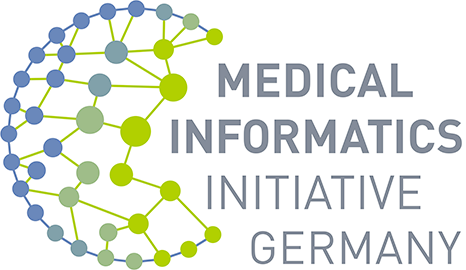Cross-institutional data integration and sharing will be vital to tomorrow’s medicine. DIFUTURE aims to provide medical professionals and researchers with data of comprehensive depth and breadth – to improve healthcare processes, accelerate innovation, and achieve tangible benefits for patients.
DIFUTURE comprises three German Universities of Excellence and their affiliated hospitals, plus additional clinical partners. The result is a unique synthesis of knowledge from the fields of medicine, informatics, biostatistics and bioinformatics. The consortium’s international connections are a further strength.
The DIFUTURE consortium is funded by BMBF during the development and networking phase since January 2018.
Die MII baut seit 2018 Dateninfrastrukturen an den Universitätskliniken auf. Anhand vielfältiger Anwendungsfälle – von der Intensiv- bis zur Krebsmedizin – demonstrierten die MII-Partner bereits den Mehrwert ihrer IT-Lösungen in der Praxis. Im Fokus der Ausbau- und Erweiterungsphase (2023-2026) steht eine erweiterte Zusammenarbeit zwischen den Universitätskliniken und deren Kooperation mit neuen Partnern, insbesondere auch aus der regionalen Versorgung.

Data integration centres
DIFUTURE data integration centres are modular, extensible, and standards-based. Specifically, data integration encompasses the harmonisation of data and processes, with a focus on ensuring high data quality. In order to guarantee interoperability, DIFUTURE deploys commercially available components with open source software. Privacy and protection play a central role, e.g. via security by design, data minimisation, and layered data security. DIFUTURE’s analyses and studies will employ distributed approaches – and will therefore prioritise method transfer rather than data transfer.
Use Cases
Use case 1: multiple sclerosis (MS)
The consortium’s doctors and scientists are active in MS research, in basic research, and in national and international groups. Data have already been integrated to enable distributed analyses. A key focus is the identification of markers and algorithms to predict the course of the disease, and allow targeted, personalised treatment from an early stage. The spectrum of integrated data is broad, ranging from clinical and laboratory data on multi-dimensional images to genetic information. It is possible to make use of extensive, largely standardised data collections.
Use case 2: Parkinson’s disease (PD)
DIFUTURE’s use cases are designed for broad applicability. For example, the integration and analysis methods employed for the MS use case can be transferred to the work on Parkinson’s disease. The latter project, too, will entail the harmonisation, quality assurance and integration of diverse types of data. These data can be used for analyses within and beyond the consortium. All DIFUTURE use cases – including for rare illnesses, cancer, stroke, and cardiovascular disease – are aimed at enabling precision medicine. The goal is to significantly improve treatment, (early) diagnoses, prevention and aftercare.
Data use and access concept
Data use is based on Germany-wide agreements for the Medical Informatics Initiative, and on in-depth preliminary work at national and international levels. DIFUTURE will follow the principles of the GO-FAIR initiative – i.e. data findability, accessibility, interoperability and reusability. Patient trust, free choice, and personal data sovereignty are central elements. To guarantee very high standards of data protection, the consortium deploys innovative methods, such as distributed computing and machine learning, plus systematic risk analyses.
Measures to strengthen medical informatics in Germany
DIFUTURE is establishing new professorships (see below) and curricula.
- Embedded intelligence for healthcare and well-being (appointment grade: W3)
- Bioinformatics/data mining/data analytics (W3)
- IT Infrastructures for translational medical research (W2)
- Medical knowledge management and clinical decision support (W3)
- Mathematical modelling and simulation of biological processes (W3)
- IT systems in healthcare, eHealth and mHealth (W3)
- Diagnostic sensors (W3)
- Visualisation of medical data (W3)
- Visual analytics of big data in the life sciences (W1)
- Methods in medical informatics (W3)
- Applied medical informatics (W3)
- Intelligent knowledge extraction in medicine (W3)





During the conceptual phase, DIFUTURE harnessed the expertise of four partners – Technical University of Munich, Ludwig Maximillian University Munich, Eberhard Karl University Tübingen, and University of Augsburg – to improve the use and exchange of data from healthcare and clinical/biomedical research across multiple institutions, and to verify value added.
To this end, it was vital to develop corresponding organisational and technological solutions. DIFUTURE created concepts for data integration centres (DICs) and for use cases that would demonstrate the tangible value of data exchange. In preparation for the conceptual phase, the consortium defined eight use cases. Disease-focused cases included neurology, cancer and cardiology. A neurology use case will be audited. Furthermore, DIFUTURE will strive to generate synergy across the chosen fields.
The conceptual phase culminated in a funding application for the initiative’s development and networking phase. DIFUTURE submitted detailed plans for further evolving the consortium partners’ relevant infrastructures. This included technological and organisational measures, and actions to strengthen medical informatics.












